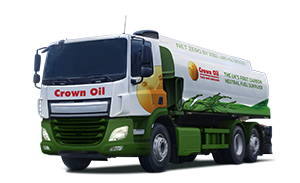
“A new 21st century fuel that’s keeping our heritage alive in a carbon zero future”
First-generation biodiesel has earned itself a bad reputation not only for its substantially high levels of greenhouse gas emissions, but also due to its volatility when stored for extended periods of time.
The Inland Waterways Association’s (IWA) Sustainable Boating Group has been exploring different routes into low carbon options and has realised the benefits that high-quality second-generation fuels such as HVO fuel can bring to the industry, including providing a straightforward solution to lowering the inland waterway’s emissions.
The trial: A heritage boat on Crown HVO fuel
We are thrilled to have joined forces with Jonathan Mosse, a member of the IWA Sustainable Boating Group, to demonstrate how HVO fuel can safeguard the boating industry’s legacy in a net zero carbon future.
Jonathan has been tasked with assessing the sustainability of HVO fuel in a boat, specifically an inland craft’s heritage and classic engine, and has full support from the National Association of Boat Owners (NABO). For this series of trials, Jonathan teamed up with travel writer and musician Tom Kitching who is currently living on a 1937 unconverted wooden-hulled oil tanker, the nb Spey, which has the original single cylinder hot bulb engine – the perfect showcase for the trials.

The historic English heritage boat embarked on a 200 mile 12-day journey on the Bridgewater Canal from Little Bollington to London while running on red HVO to test how well the renewable diesel performs in a Bolinder 15hp single cylinder two-stroke crude oil engine.
While HVO has a wide range of OEM endorsements from Volvo to Yanmar to Vetus, the question here was whether this modern innovative fuel would be compatible with an old, craggy engine whose manufacturer is no longer in existence.
The results
HVO performed similarly to red diesel, with a more responsive engine and cleaner exhaust. Following several successful trials, nb Spey has now made the switch to red HVO fuel for good, reducing the engine’s net CO2 greenhouse gas emissions by around 90%, as well as significantly reducing nitrogen oxide (NOx) emissions and particulate matter.
I can report that fuel consumption improved dramatically, fumes and smoke from the exhaust were greatly reduced, the engine was quieter, more predictable and controllable, while persuading it to reverse in time of need (and when she picked up an inner-city ‘bladefull’) was considerably more reliable.
The HVO trial with Spey has been a great success. The outcome bodes very well for the entire heritage sector running diesel engines.
Crown Oil want to show that it’s a direct replacement for all diesel engines, and I’m happy to help prove that it can work. We’ve run trials with it these last few weeks and have now made the switch for good. This will reduce our engine’s greenhouse emissions by around 80-90%, as the fuel is created from renewable sources.
nB Spey is excited to continue steaming through the heart of the canal country to help spread the word about this new generation fuel on the inland waterways.
Jonathan mosse
The benefits of using HVO on the inland waterways
HVO is completely stable when stored for up to 10 years, remains free-flowing down to at least -32°C and is not hygroscopic, meaning it doesn’t attract water.
In other words, unlike first-generation biodiesel, it doesn’t promote the growth of diesel bug. What’s more, it is 100% miscible, meaning that it happily mixes with all other diesel fuel products.
HVO is the only direct replacement that will allow the continuation of English heritage boating as it currently is.
- FAME-free, fossil-free fuel
- Year-round performance and superior cold weather performance
- Up to 90% lower net CO2 emissions
- Up to 10 year shelf life (compared to 1 year for fossil diesel)
- Clean burning fuel, reducing particulate build-up and engine wear
- Drop-in fuel that meets EN15940 standards
- Large number of OEM approvals
- Produced from certified renewable waste sources
Going forward, the IWA will be calling for greater use of HVO on the waterways. We look forward to continuing to prove how HVO offers an immediate and straightforward solution to decarbonisation.
Join the Inland Waterways Association’s Sustainable Boating Group on the road to becoming carbon neutral and switch to HVO fuel today. Call our fuel experts today on 0330 123 1444 to find out more or visit our HVO fuel FAQs page for more information, or view more of our Crown HVO fuel customer case studies.





